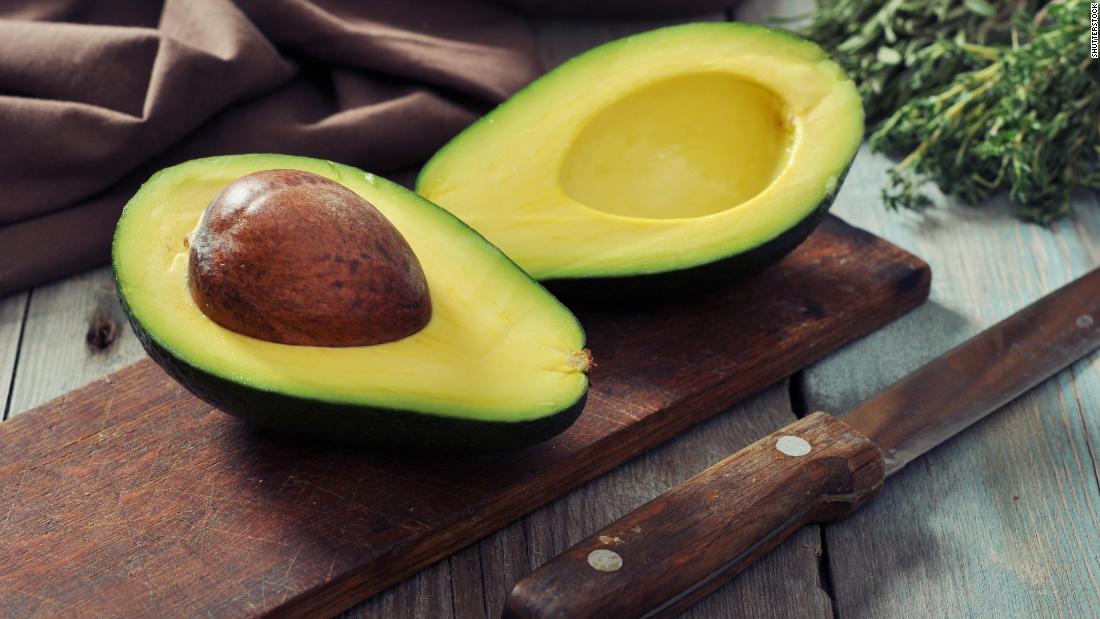The 5 reasons why you should consume avocado 0:51
(CNN) --
Eating avocados reduces the risk of stroke or heart attack in both men and women, even when consumed in place of butter, cheese or processed meats, according to a new study.
Cardiovascular diseases are one of the leading causes of death worldwide, claiming almost 18 million lives a year, according to the World Health Organization.
In the United States alone, the Centers for Disease Control and Prevention (CDC) say that cardiovascular disease is behind the loss of one life every 36 seconds.
4 benefits of avocados for your health
Eating at least two servings of avocado a week reduced the risk of heart attack by 21% compared to avoiding or not eating avocados frequently.
However, there was no equivalent benefit in reducing the risk of stroke or brain attack, according to the study published Wednesday in the Journal of the American Heart Association.
A serving of avocado, which is a fruit, was defined as "½ avocado or ½ cup of avocado, weighing approximately 80 grams," said study author Lorena Pacheco, a postdoctoral researcher in the department of nutrition at the School of Public Health. TH Chan of Harvard in Boston.
"While no one food is the solution to routinely eating a healthy diet, this study is proof that avocados have potential health benefits," said Cheryl Anderson, president of the Council on Epidemiology and Prevention at the American Heart Association. (AHA, for its acronym in English), in a statement.
Anderson was not involved in the study.
5 tips to take care of your heart health beyond Valentine's Day 1:33
"We desperately need strategies to improve intake of the healthy diets recommended by the AHA, such as the Mediterranean diet, which are rich in vegetables and fruits," said Anderson, who is also a professor and dean of the Herbert Wertheim School of Public Health and Sciences. of Human Longevity at the University of California, San Diego.
advertising
long-term study
The study followed more than 68,000 women and 41,000 men enrolled in two long-term government studies of chronic disease risk factors: the Nurses' Health Study and the Health Professionals Follow-up Study.
All participants were free of cancer, coronary heart disease and stroke at the start of the studies and completed dietary questionnaires every four years for a period of 30 years.
In addition to looking at the overall impact of avocado consumption, the researchers ran statistical modeling and found that consuming a half serving of avocado (¼ cup) per day instead of the same amount of eggs, yogurt, cheese, margarine, butter, or meats processed foods (such as bacon) reduced the risk of heart attack by 16% to 22%.
The Mediterranean diet is once again crowned the best for 2022: how does it work and what to do to start?
"The entire benefit of routine avocado consumption seen here stems from the introduction of avocado into the diet, and the exclusion of less healthy foods," said Dr. David Katz, Specialist in Lifestyle and Preventive Medicine and at Nutrition, who was not involved in the study.
However, the study found no difference in risk reduction when half a serving of avocado was substituted for an equivalent serving of nuts, olive oil, and other vegetable oils.
This makes sense, according to Katz, because the health benefits depend on the food being substituted.
"If, for example, the common trade-off were between avocado and walnuts or almonds, the health effects would likely be negligible, since the foods have similar nutritional properties and expected health effects," said Katz, president and Founder of the nonprofit True Health Initiative, a global coalition of experts dedicated to evidence-based lifestyle medicine.
But if avocado were to replace butter and margarine spreads, or eaten instead of processed meats or cheese in a sandwich, "the nutritional differences are considerable" and health outcomes would be expected to change, he added.
Although avocados are "especially rich sources of monounsaturated fats, polyunsaturated fats and fiber," they can also be expensive and therefore not affordable for everyone, Katz said.
Other similar substitutes could include walnuts, almonds, olives, olive oil and a variety of seeds such as pumpkin seeds and flax, she said.
Other foods that can be included that have significant health benefits at "much lower prices" include kidney beans, chickpeas and lentils, "and perhaps whole grains and related seeds like quinoa," Katz said. .
Prevent heart disease
Preventing heart disease means keeping your weight, blood pressure, and cholesterol under control, getting plenty of sleep and regular exercise, managing stress, limiting alcohol and tobacco use, and eating a healthy diet with less sugar, processed foods and saturated fat, according to the National Library of Medicine.
The American Heart Association states that the body needs fat to increase energy, protect organs, produce hormones, and aid in the absorption of nutrients.
However, monounsaturated and polyunsaturated fats are the most heart-healthy choices.
Olive oil, canola oil, peanut oil, safflower oil, and sesame oil are sources of monounsaturated fat, along with avocados, peanut butter, and many nuts and seeds.
Three tips from a specialist to prevent heart problems
Saturated fats and trans fats increase levels of LDL, known as "bad cholesterol," according to the AHA.
Saturated fats, like butter, are usually solid at room temperature and are found in full-fat dairy products, eggs, coconut and palm oils, and fatty cuts of beef, pork, and poultry with skin.
Artificially manufactured trans fats, also called partially hydrogenated oils, increase bad LDL cholesterol and lower good HDL cholesterol, which can increase the risk of heart disease, stroke, and type 2 diabetes. They are often found in "fried foods." such as doughnuts, and in baked goods such as cakes, pie crusts, cookies, frozen pizza, crackers, stick margarines, and other spreads," according to the AHA.
Cardiovascular diseasesInfarction






